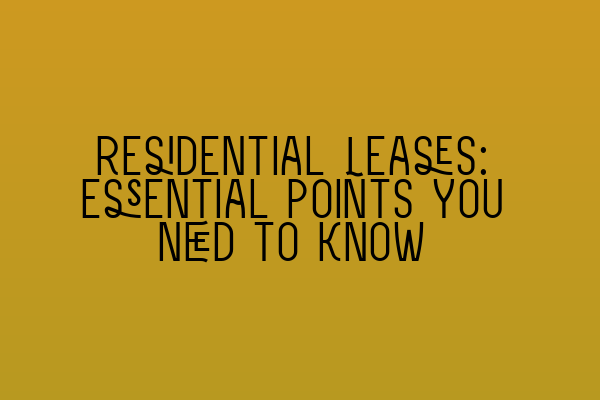Residential Leases: Essential Points You Need to Know
Are you a property owner looking to lease your residential property? Or perhaps you are a tenant interested in renting a property for your own accommodation? Whatever your situation may be, understanding the key points of residential leases is essential.
In this article, we will cover the important aspects of residential leases that both landlords and tenants should be familiar with. Whether you are new to property law or just need a refresher, this guide will provide you with the necessary information to navigate the world of residential leases.
1. Duration of the Lease
One of the first things to consider when entering into a residential lease is its duration. How long do you want the lease term to be? Residential leases can typically range from six months to several years, depending on the agreement between the landlord and tenant. It is important to clearly define the start and end dates of the lease to avoid any confusion or disputes.
2. Rent and Payment Terms
The next crucial aspect of a residential lease is the rent and payment terms. The lease should clearly state the rental amount, when it is due, and how it should be paid (e.g., bank transfer, direct debit, or cash). Landlords may also include clauses regarding late payment penalties or any other additional fees associated with the rental property.
3. Security Deposit
Most residential leases require tenants to provide a security deposit. This is a sum of money paid upfront by the tenant to the landlord to cover any damages or unpaid rent at the end of the lease term. The lease should outline the amount of the security deposit, the conditions for its return, and any deductions that may be made from it.
4. Maintenance and Repairs
Both landlords and tenants should understand their respective responsibilities when it comes to maintenance and repairs. Typically, landlords are responsible for maintaining the property’s structure and major systems (e.g., plumbing, electrical), while tenants are responsible for keeping the property clean and reporting any necessary repairs promptly. It is important to clearly outline these obligations in the lease to avoid disputes down the line.
5. Termination and Renewal
Residential leases often have provisions regarding termination and renewal. The lease should specify the notice period required for either party to terminate the agreement. Additionally, it should outline the process for renewing the lease if both parties are interested in extending the tenancy. Understanding these clauses will help avoid any confusion or unexpected changes in your living situation.
6. Rights and Obligations
Both landlords and tenants have rights and obligations under a residential lease. Landlords have the right to collect rent, enter the property for inspections or repairs (with proper notice), and enforce lease terms. Tenants have the right to peaceful enjoyment of the property, proper notice before entry by the landlord, and timely repairs. It is important to be aware of these rights and obligations to ensure a harmonious landlord-tenant relationship.
7. Legal Implications
Understanding the legal implications of a residential lease is crucial. Both parties should be aware of their legal rights and obligations, as well as any local or national laws governing residential leases. Seek legal advice if needed to ensure compliance with all relevant regulations.
Final Thoughts
Residential leases are an essential part of property law, and understanding their key points is crucial for both landlords and tenants. By familiarizing yourself with the terms and conditions outlined in the lease, you can protect your rights, avoid disputes, and create a positive living or renting experience.
If you’re preparing for the SQE exams or looking for practice exams or courses, check out our related articles:
– SQE 1 Practice Exam Questions
– SQE 1 Practice Mocks FLK1 FLK2
– SQE 2 Preparation Courses
– SQE 1 Preparation Courses
– SRA SQE Exam Dates
Remember, a well-drafted residential lease can save you time, money, and stress in the long run. If you need assistance with drafting or reviewing your residential lease agreement, don’t hesitate to reach out to our team of property law experts at SQE Property Law & Land Law.
Disclaimer: This article is for informational purposes only and does not constitute legal advice. Always consult with a qualified solicitor for personalized advice tailored to your specific situation.
